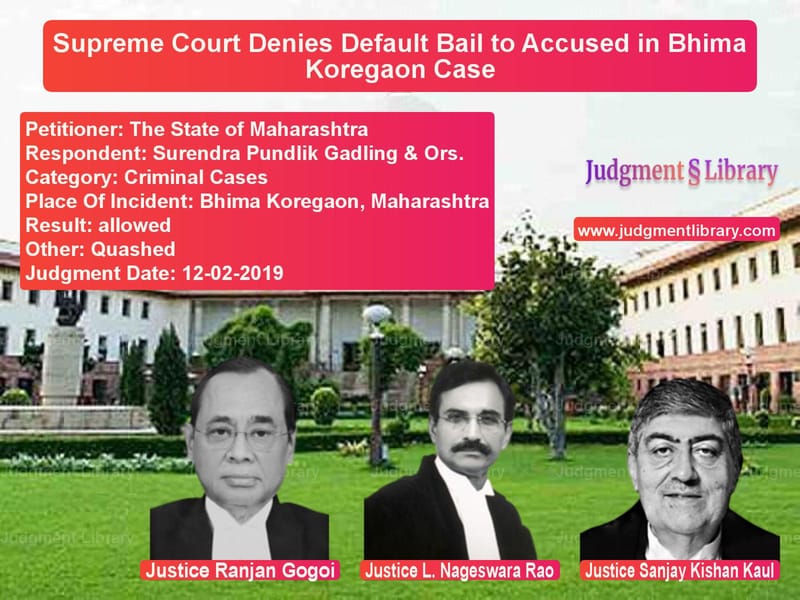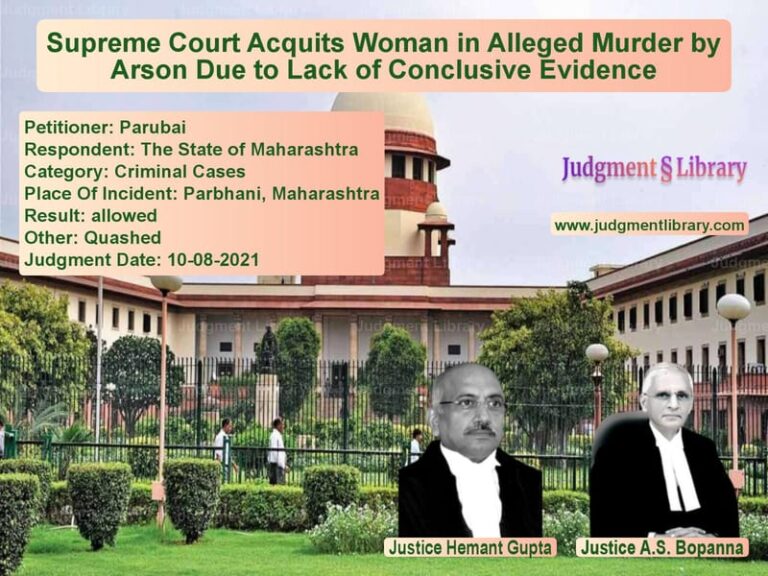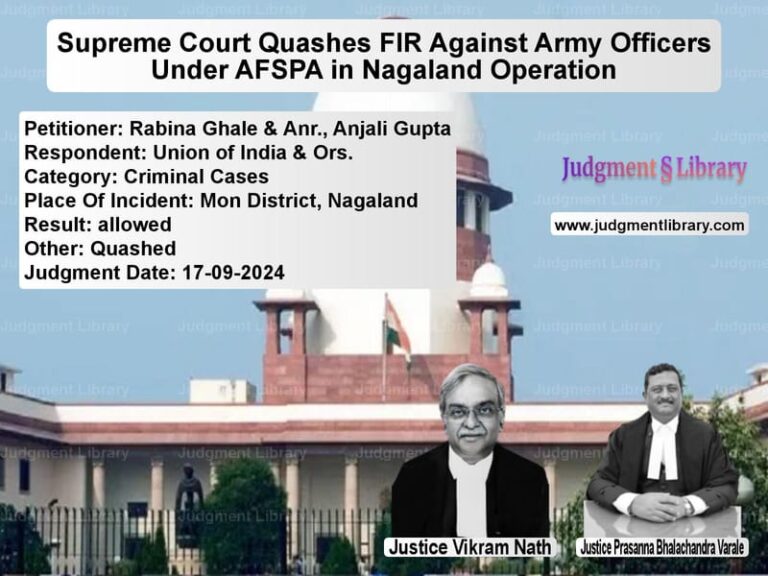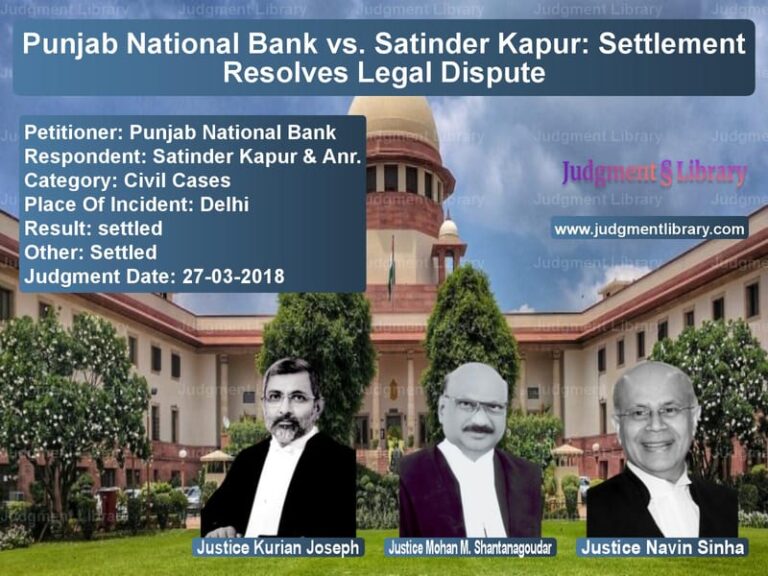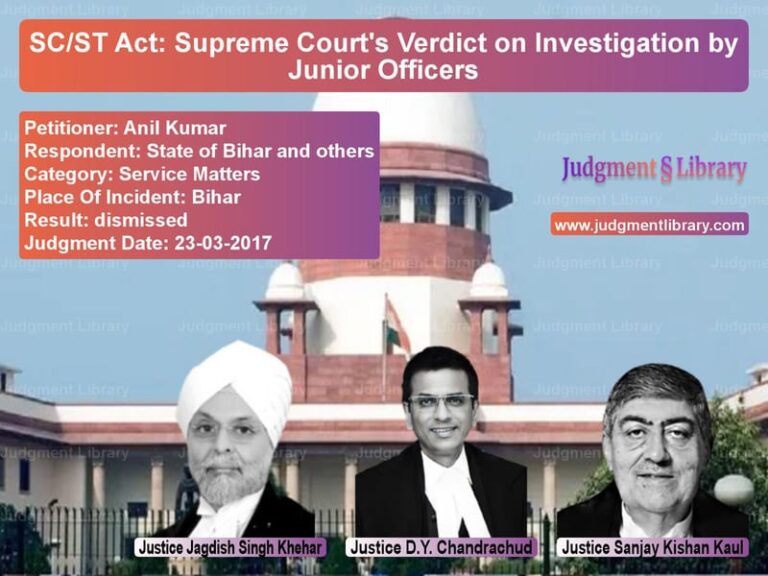Supreme Court Denies Default Bail to Accused in Bhima Koregaon Case
The case of The State of Maharashtra vs. Surendra Pundlik Gadling & Ors. is a landmark Supreme Court ruling concerning the interpretation of default bail under Section 43D(2)(b) of the Unlawful Activities (Prevention) Act, 1967 (UAPA). The judgment clarifies the legal requirements for extending detention beyond 90 days for ongoing investigations and upholds the procedural safeguards that must be followed by investigating authorities and public prosecutors.
Background of the Case
The case arose from the Bhima Koregaon violence that occurred on January 1, 2018, following an event organized under the banner of Elgar Parishad in Pune on December 31, 2017. The prosecution alleged that members of Kabir Kala Manch, along with the accused, had conspired to incite violence, promoted Maoist ideologies, and engaged in activities against the sovereignty of India.
Several individuals were arrested in connection with the violence and charged under the UAPA. On August 30, 2018, the State of Maharashtra sought an extension of 90 more days to file a charge sheet, citing delays in obtaining forensic reports and additional investigative requirements. The trial court granted this extension. However, the accused challenged the extension before the Bombay High Court, which ruled that the procedural requirements under Section 43D(2)(b) of the UAPA were not met, thereby entitling the accused to default bail.
Aggrieved by this ruling, the State of Maharashtra approached the Supreme Court, challenging the High Court’s decision and seeking reversal of the default bail granted to the accused.
Legal Issues in the Case
- Whether the prosecution followed the correct procedure for extending the investigation period beyond 90 days?
- Whether the application for an extension submitted by the public prosecutor satisfied the legal requirements?
- Whether the accused were entitled to default bail?
Arguments Presented
Appellant’s (State of Maharashtra) Arguments
- The delay in filing the charge sheet was due to the complexity of the investigation, which involved large volumes of electronic data and forensic analysis.
- The application for extension was filed within the prescribed time limit and contained valid reasons for seeking additional time.
- The accused were involved in anti-national activities and granting them bail would pose a serious threat to national security.
- The High Court wrongly interpreted procedural requirements and should not have interfered with the trial court’s order.
Respondents’ (Accused) Arguments
- The application for an extension was not filed by the public prosecutor as required by law but was instead submitted by the investigating officer.
- The application lacked independent scrutiny by the public prosecutor and was merely a forwarded request from the police.
- Since the charge sheet was not filed within 90 days and the extension was granted without fulfilling procedural requirements, the accused were entitled to default bail under Section 167(2) CrPC.
Supreme Court’s Observations and Judgment
1. Procedural Compliance Under Section 43D(2)(b) of UAPA
The Supreme Court analyzed the requirements under Section 43D(2)(b) of the UAPA, which allows an extension of up to 180 days for investigation if the court is satisfied with the public prosecutor’s report. The Court ruled:
“The report must indicate the progress of the investigation and provide specific reasons for detaining the accused beyond 90 days. Mere reproduction of the investigating officer’s request does not suffice.”
2. Role of the Public Prosecutor in Seeking an Extension
The Court held that the public prosecutor must apply independent legal scrutiny before filing an extension request. The ruling stated:
“The Public Prosecutor is not a mere forwarding agent of the investigating agency. The report must demonstrate the application of mind and must not be a verbatim copy of the investigating officer’s request.”
3. Deficiency in the Extension Application
The Court found that the extension request did not meet the legal requirements as it was primarily prepared by the investigating officer and merely endorsed by the public prosecutor without independent assessment. The Court observed:
“A mechanical endorsement of the investigating officer’s request cannot be treated as the ‘report of the Public Prosecutor’ as required under the UAPA.”
4. Default Bail and Public Safety Concerns
The Court acknowledged that while the procedural lapse had occurred, the accused were charged with serious offenses that posed national security concerns. The ruling clarified:
“While procedural safeguards are essential, the larger public interest and security of the state must be balanced with individual rights. The failure of procedural compliance does not automatically entitle an accused to release if the delay was justified.”
5. Final Directions
The Supreme Court overruled the Bombay High Court’s decision and denied default bail to the accused. The Court ordered:
- The accused shall remain in custody until the completion of the trial.
- The charge sheet filed within the extended period shall be considered valid.
- Any further bail applications should be decided on merits and not on procedural lapses.
Final Judgment
The Supreme Court:
- Set aside the Bombay High Court’s order granting default bail.
- Confirmed the validity of the extension granted by the trial court.
- Held that public prosecutors must independently assess extension requests before filing them.
- Clarified that national security concerns can override minor procedural lapses in investigations.
Legal Implications of the Judgment
This ruling has significant implications for national security laws and criminal procedure:
- Clarification of Default Bail Provisions: Accused persons cannot automatically claim default bail if procedural lapses do not affect the investigation’s legitimacy.
- Accountability of Public Prosecutors: Public prosecutors must independently evaluate extension requests to prevent misuse by investigating agencies.
- Balancing Individual Rights and National Security: The judgment establishes that procedural rights must be weighed against larger public interest considerations.
- Stricter Compliance with UAPA: Investigating agencies must ensure timely compliance with procedural requirements to avoid legal challenges.
Conclusion
The Supreme Court’s ruling in The State of Maharashtra vs. Surendra Pundlik Gadling & Ors. is a landmark decision balancing due process with national security concerns. While reinforcing procedural safeguards under UAPA, the judgment clarifies that minor procedural lapses will not automatically entitle an accused to default bail in cases involving serious offenses. The ruling ensures that investigative agencies adhere to proper procedures while maintaining national security as a priority.
Petitioner Name: The State of Maharashtra.Respondent Name: Surendra Pundlik Gadling & Ors..Judgment By: Justice Ranjan Gogoi, Justice L. Nageswara Rao, Justice Sanjay Kishan Kaul.Place Of Incident: Bhima Koregaon, Maharashtra.Judgment Date: 12-02-2019.
Don’t miss out on the full details! Download the complete judgment in PDF format below and gain valuable insights instantly!
Download Judgment: The State of Maharas vs Surendra Pundlik Gad Supreme Court of India Judgment Dated 12-02-2019.pdf
Direct Downlaod Judgment: Direct downlaod this Judgment
See all petitions in Bail and Anticipatory Bail
See all petitions in Terrorist Activities
See all petitions in Judgment by Ranjan Gogoi
See all petitions in Judgment by L. Nageswara Rao
See all petitions in Judgment by Sanjay Kishan Kaul
See all petitions in allowed
See all petitions in Quashed
See all petitions in supreme court of India judgments February 2019
See all petitions in 2019 judgments
See all posts in Criminal Cases Category
See all allowed petitions in Criminal Cases Category
See all Dismissed petitions in Criminal Cases Category
See all partially allowed petitions in Criminal Cases Category

